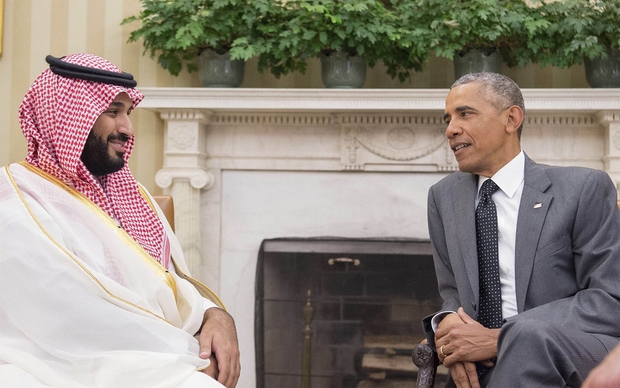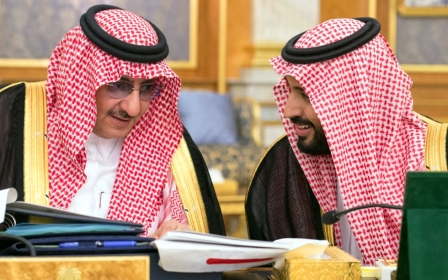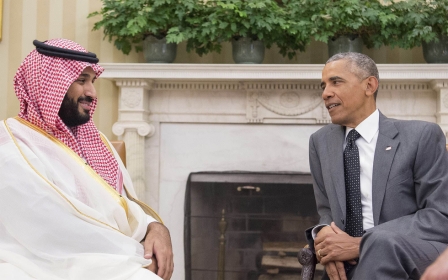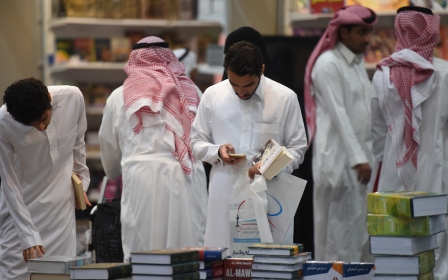UN chief meets Saudi Prince Salman to discuss Yemen

UN Secretary General Ban Ki-moon on Wednesday hosted Saudi Arabia's deputy crown prince Mohammed bin Salman for talks that touched on the row between the world body and Riyadh over the deaths of hundreds of children in Yemen.
The meeting at UN headquarters in New York was low-key, and neither Ban nor the Saudi prince spoke to reporters.
Mohammed bin Salman is the Saudi king's son and the country's defence minister. He also has become the driving force behind economic reform and a more activist Saudi foreign policy.
A UN statement said the two men had discussed "putting into place concrete measures that could improve the situation on the ground" in Yemen, notably with respect to protecting children and civilians affected by the conflict.
Tensions flared recently when the UN briefly blacklisted the Saudi-led coalition in Yemen, after an expert report found it responsible for 60 percent of the 785 children killed in the country last year.
The blacklisting infuriated Saudis, and the UN removed the coalition from the list pending a fact review.
Ban went on to publicly accuse Riyadh - a major UN donor - and its allies of financial blackmail, saying they threatened to cut off funds to certain UN agencies, including a Palestinian aid programme.
Saudi Arabia has rejected both those charges and the report's findings.
Ban is to formally present the report on children and armed conflict to the UN Security Council in August.
During Wednesday's meeting with the Saudi prince, he "expressed the hope that ... he could point to progress on the protection of children and civilians in Yemen" by that time, the UN statement said.
Ban "remains open to receiving any new elements from Saudi Arabia and hoped that discussions would take place soon," the statement from Ban's office said.
The Riyadh-led military intervention is supporting the Yemeni government in its fight against Houthi rebels, primarily through air strikes that began in March 2015.
The Saudi government has requested that the UN send a team of experts to the coalition headquarters in Riyadh to jointly review the report and for the UN to provide details on its sources and methods. The world body has not yet responded.
On Wednesday, Ban "thanked Saudi Arabia for supporting the political work of his special envoy, Ismail Ould Cheikh Ahmed, and stressed the urgency of ending the conflict," his office said.
Ban and Mohammed bin Salman also discussed the situation in Syria, Libya, Lebanon and the Israeli-Palestinian peace process, the UN said.
The UN secretary general is due in the Middle East next week to meet with Israeli and Palestinian leaders, and also to discuss Yemen during a stop in Kuwait.
US President Barack Obama hosted bin Salman at the White House last Friday to discuss ending the war in Yemen and allowing a political solution to take hold.
The US has aided and publicly backed the operation to push back against Houthi rebels, widely reported to be supported by Iran, who took over the capital, Sanaa.
The war signalled Saudi Arabia's desire to tackle Iranian influence in the region, but Obama's administration has been repeatedly embarrassed by the killing of civilians and concerned that while the war has dragged on al-Qaeda has been allowed to grow.
More than 6,400 Yemenis have been killed since the intervention started 15 months ago, the majority of them civilians.
There are signs that the war may be winding down and Saudi Arabia and its allies may be shifting focus to tackling al-Qaeda, even though the Houthis remain in control of most of the central and northern highlands as well as the Red Sea coast.
The United Arab Emirates on Wednesday announced its "war is over" in Yemen, although it left open the possibility of a continued counterterrorism role.
"The president welcomed Saudi Arabia's commitment to concluding a political settlement of the conflict," the White House said.
New MEE newsletter: Jerusalem Dispatch
Sign up to get the latest insights and analysis on Israel-Palestine, alongside Turkey Unpacked and other MEE newsletters
Middle East Eye delivers independent and unrivalled coverage and analysis of the Middle East, North Africa and beyond. To learn more about republishing this content and the associated fees, please fill out this form. More about MEE can be found here.




